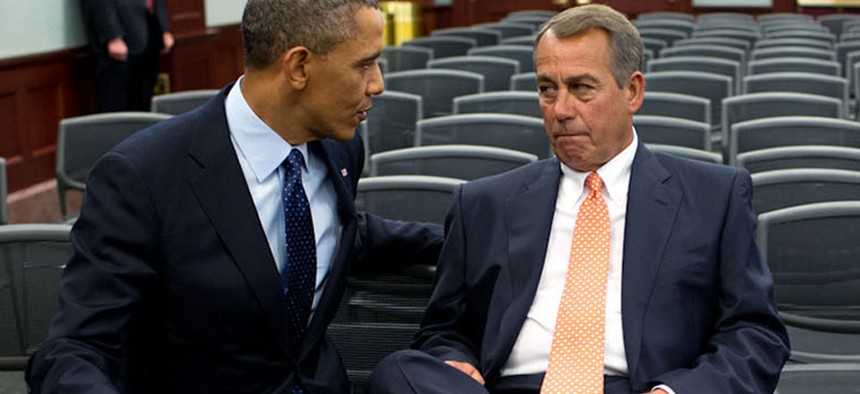
White House file photo
Will Boehner's Lawsuit Compromise the House General Counsel?
Former in-house counsels say the suit against Obama is too political for the nonpartisan office.
After a second law firm dropped involvement in the House's lawsuit against President Obama, House Speaker John Boehner will turn to the chamber's in-house counsel, a decision former occupants of the office say could tarnish its nonpartisanship.
Several former House general counsels who served under both parties told National Journal that placing the nonpartisan House Office of the General Counsel at the head of a politically charged lawsuit puts General Counsel Kerry Kircher in an awkward position.
"He'd rather not be carrying it; they'd rather not lump it on him. Bringing him in isn't going to make it look nonpolitical, but it's going to make him look political," said Charles Tiefer, who served as solicitor and deputy general counsel under Democratic rule for 11 years before becoming acting general counsel from 1993 to 1994. "What doing this lawsuit undermines is the attempt for the House counsel's office to be somewhat like the house parliamentarian's office: a place both parties place their trust regardless of the succession of one party or the other to the majority."
Kircher did not respond to a request for comment. But Tiefer, who has called the lawsuit "an embarrassing loser for the House," is not the only former general counsel who thinks handing the suit to Kircher could be troublesome.
Cheryl Lau, who served under Republicans from 1995 to 1996, also said that although she believes Kircher is fully equipped to handle the suit, doing so could be problematic.
"Perhaps that puts the general counsel in an awkward position," she said. "The general counsel's office really is a nonpartisan office. It has to be very impartial, and maybe that was one of the reasons why it was decided, 'Better go to law firms first.' "
Boehner announced this summer that the House would sue Obama for failing to implement the Affordable Care Act's mandate that employers provide health insurance to their employees, thus causing institutional injury to Congress. The House voted along party lines to approve the suit, and Boehner's office had expected to file it in September, but the filing never happened.
The lawsuit resurfaced this week after it was revealed that a second law firm declined to prosecute the case. Bill Bruck of the firm Quinn Emanuel dropped representation of the case,Politico first reported. That comes after David Rivkin of Baker Hostetler, one of the minds behind the legal theory underpinning the lawsuit, also dropped the case. Both firms were reportedly under pressure from the left not to engage in a lawsuit against the president.
"The litigation remains on track, but we are examining the possibility of forgoing outside counsel and handling the litigation directly through the House, rather than through law firms that are susceptible to political pressure from wealthy, Democratic-leaning clients," Boehner spokesman Kevin Smith said in a statement. "We are also closely following what the administration does on executive amnesty, and the possible impact that could have on the litigation strategy."
The House's Office of General Counsel defends members in lawsuits against them and in cases where a member receives a subpoena. The office also councils committees and members on proper procedures and ethics, among other things.
Placing the general counsel in charge would certainly cost less, keeping the House from spending millions of dollars on outside counsel, as they did while unsuccessfully defending the Defense of Marriage Act. But Democrats still criticize the case as frivolous.
"The merits of the suit, I think, are suspect," said former House General Counsel Stan Brand. "I don't see this case getting beyond preliminary hearing."
Still, others believe the House should have its day in court and the general counsel should be the one to represent the body. Stephen Ross, who served as general counsel under Democrats from 1983 to 1993, said that since a majority of the House voted to authorize the lawsuit, the general counsel has a responsibility to carry out the chamber's will, no matter the political ramifications.
"If you're going to do the job as counsel to the House, you have to sort of take a little bit of a blind eye to what the partisan reaction will be," he said. "The role of the office of general counsel is to represent the position and interests of the House in litigation, including in litigation involving other branches of government."
Despite the embarrassing delays in filing the case, Tiefer said there could be a benefit for Boehner. Some have speculated that the case is slight of hand on Boehner's part, appeasing elements in his party that want to impeach Obama while not going so far as to actually do it.
"The longer it takes to decide who is counsel, the longer it takes for this embarrassing loser to get judicially trounced, and the longer until House Republicans have to answer their constituents about why they don't impeach President Obama," Tiefer said.
This article appears in the November 3, 2014 edition of NJ Daily.







